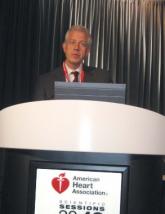Dr. Michael J. Koren presented the findings of MENDEL-2. This 12-week, double-blind, placebo- and ezetimibe-controlled, multicenter, phase-III study included 614 patients with a baseline LDL cholesterol level of 100-190 mg/dL. None were permitted to be on a statin. Statins are known to upregulate PCSK9 production, so it was important to find out whether evolocumab performs differently depending upon whether patients are on that workhorse therapy. As in RUTHERFORD-2, the evolocumab group was randomized to 140 mg biweekly by autoinjector or to monthly treatment at 420 mg. Over the course of 12 weeks, LDL dropped by 57% with biweekly evolocumab and 56% with monthly injections.
"Though we anticipate that evolocumab will find use primarily as a treatment for high-risk patients in conjunction with statins, MENDEL-2 has demonstrated that evolocumab produces large LDL-lowering effects as monotherapy," said Dr. Koren of the Jacksonville (Fla.) Center for Clinical Research.
Dr. Thomas, the session cochair, said it will be interesting to see how the Food and Drug Administration responds to the new phase III data. Large studies with cardiovascular event endpoints are ongoing. The FDA may want to wait for evidence from those studies showing that large-magnitude LDL cholesterol lowering reduces events, or the agency might be inclined to approve PCSK9 inhibitor therapy for selected high-risk populations.
"I think the RUTHERFORD-2 trial in heterozygous familial hypercholesterolemia patients was particularly interesting. Perhaps the new agents could first be approved for use in that population, because those patients clearly have a very high rate of premature coronary disease," the cardiologist said.
As for safety, Dr. Thomas said "We’ve continued to look for problems with these agents, but so far, we can’t find any off-target effects. Results 2-3 years out in ongoing open-label studies will be very important."
Dr. Blom, Dr. Raal, and Dr. Koren reported receiving research grants and consultant’s fees from Amgen, which sponsored the evolocumab phase III trials. Dr. Thomas reported receiving research grants and consultant’s fees from Sanofi, which is developing another PCSK9 inhibitor.
Simultaneous with Dr. Blom’s presentation, the DESCARTES results were published online (N. Engl. J. Med. 2014 March 29 [doi:10.1056/NEJMoa1316222]). The MENDEL-2 study was also simultaneously published (J. Am. Coll. Cardiol. 2014 March 29 [doi:10.1016/j.jacc.2014.03.018]).
bjancin@frontlinemedcom.com
